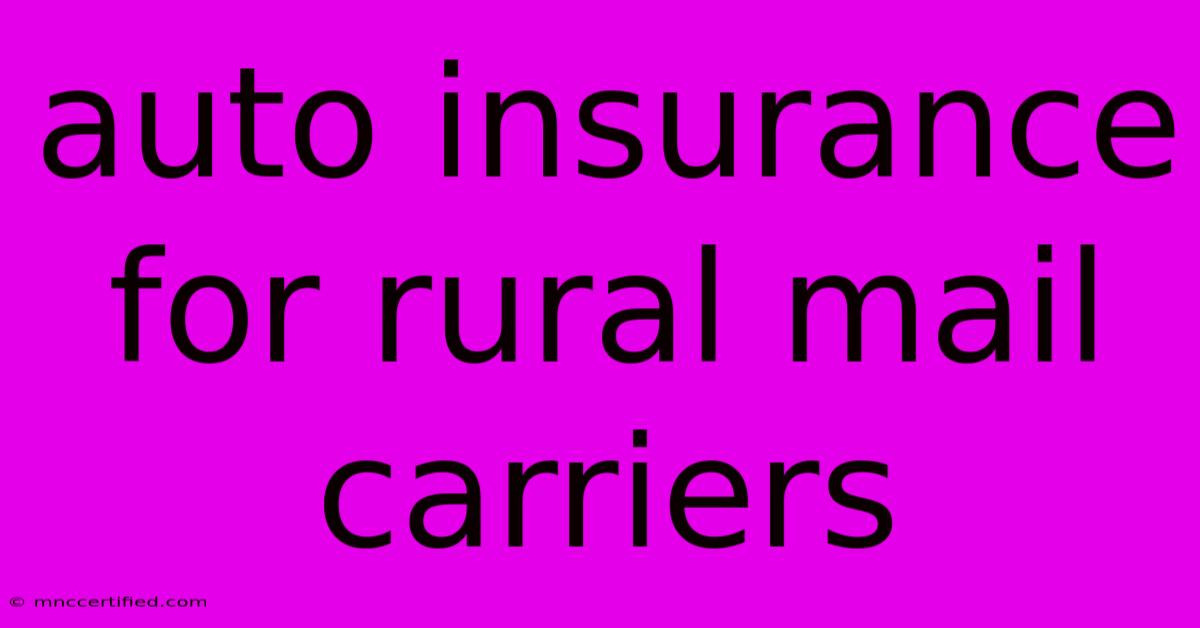Auto Insurance For Rural Mail Carriers

Table of Contents
Navigating the Roads: Auto Insurance for Rural Mail Carriers
Rural mail carriers face unique challenges on the road. They traverse diverse landscapes, navigate unpredictable weather conditions, and often encounter isolated stretches with limited assistance. These factors demand a specific approach to auto insurance, ensuring adequate coverage for the unique risks associated with this profession.
Why Standard Coverage May Not Be Enough
While standard auto insurance policies can provide basic protection, they often fall short of addressing the specific needs of rural mail carriers. Here's why:
- Higher Mileage: Rural routes involve significantly more mileage compared to urban delivery, increasing the chances of accidents and wear and tear on vehicles.
- Unpredictable Conditions: From snow-covered roads to narrow, winding paths, rural carriers encounter a wide range of road conditions that increase risk.
- Limited Assistance: Remote locations may limit access to emergency services, leading to longer response times and potential complications.
- Cargo Liability: Carrying mail and packages exposes carriers to potential liability claims in case of damage or loss.
Essential Coverage for Rural Mail Carriers
To ensure adequate protection, rural mail carriers should consider these key insurance components:
1. High Liability Limits: Given the potential for significant damage and injury, carriers should opt for high liability limits to cover legal expenses, medical bills, and property damage.
2. Comprehensive and Collision Coverage: These coverages protect against damage caused by events like theft, vandalism, or collisions with animals. Essential for rural routes where risks are heightened.
3. Uninsured/Underinsured Motorist Coverage: Safeguards carriers against drivers who are uninsured or underinsured, ensuring financial protection in case of an accident involving a negligent driver.
4. Rental Reimbursement Coverage: Provides financial assistance for renting a replacement vehicle if your insured vehicle is damaged or stolen, ensuring uninterrupted service.
5. Cargo Coverage: Protects against loss or damage to mail and packages while in transit.
6. Business Use Coverage: Essential for carriers who use their personal vehicle for work purposes. This coverage tailors policy benefits to meet the specific needs of professional drivers.
Finding the Right Policy
When seeking auto insurance, rural mail carriers should consider these key factors:
- Reputation and Stability: Opt for reputable insurance companies with a proven track record of customer service and financial stability.
- Competitive Pricing: Compare quotes from multiple insurers to secure the best value for your coverage needs.
- Customer Service: Choose an insurer known for prompt and responsive customer service, particularly crucial for rural locations.
- Specialized Coverage: Look for insurers offering policies specifically designed for commercial drivers, catering to the unique risks associated with rural mail delivery.
Proactive Steps for Protection
Beyond comprehensive insurance, rural mail carriers can enhance their safety by implementing proactive measures:
- Vehicle Maintenance: Regular maintenance, including tire checks, fluid levels, and overall vehicle inspections, minimizes the risk of breakdowns and accidents.
- Defensive Driving: Practicing defensive driving techniques helps anticipate potential hazards and react safely in challenging situations.
- Weather Awareness: Staying informed about weather conditions and planning routes accordingly helps avoid hazardous conditions and potential delays.
Conclusion
Navigating the roads as a rural mail carrier demands a dedicated approach to auto insurance. By prioritizing comprehensive coverage, securing tailored policies, and implementing proactive safety measures, carriers can effectively mitigate risks and ensure financial protection while delivering essential services to their communities.

Thank you for visiting our website wich cover about Auto Insurance For Rural Mail Carriers. We hope the information provided has been useful to you. Feel free to contact us if you have any questions or need further assistance. See you next time and dont miss to bookmark.
Featured Posts
-
Putin Seeks To Manipulate Trumps Actions
Nov 09, 2024
-
How Much Is Lab Work Without Insurance
Nov 09, 2024
-
Does Insurance Cover Wigs For Alopecia
Nov 09, 2024
-
For Amusement Only Coin Price In India
Nov 09, 2024
-
Dwp Christmas Bonus Payment Dates
Nov 09, 2024